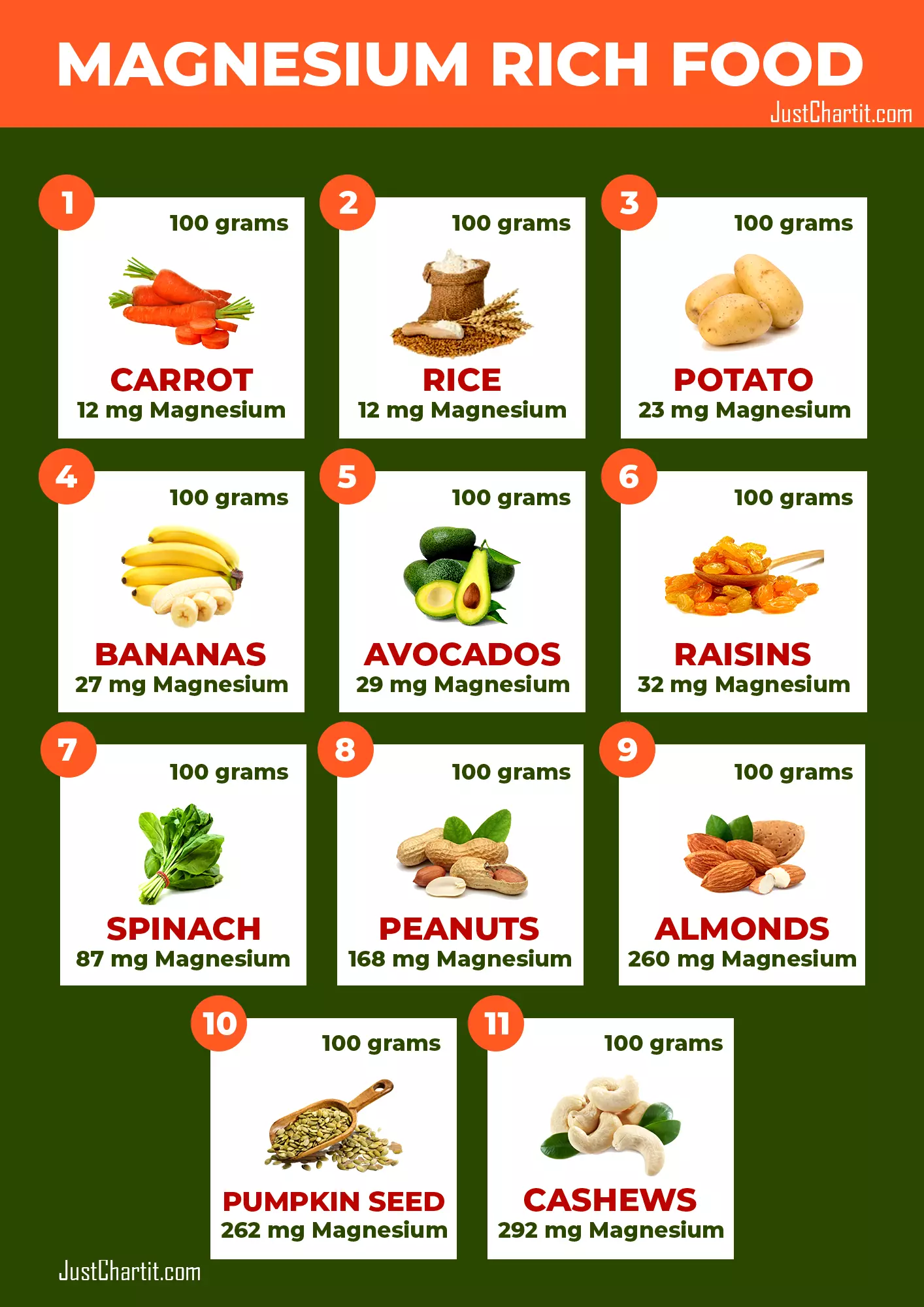Do you ever feel inexplicably fatigued, experience muscle cramps that disrupt your sleep, or battle persistent headaches? These could be signs your body is deficient in a crucial mineral: magnesium. There are more or less major 11 Warning Signs Of Magnesium Deficiency.
By understanding the role of magnesium in your health, you can empower yourself to identify potential deficiencies and take steps to optimize your well-being.
Magnesium is a powerhouse mineral that acts as an electrolyte, regulating essential bodily functions. It plays a vital role in over 300 biochemical reactions, impacting everything from muscle function and energy production to nerve function and blood sugar control.
Despite its importance, magnesium deficiency is surprisingly prevalent. Estimates suggest up to 80% of Americans may not be meeting their recommended daily intake of magnesium. This deficiency can lead to a cascade of unpleasant symptoms and potentially contribute to chronic health issues. This blog will help to understand the causes, symptoms, and strategies how to treat low magnesium
Different Magnesium Types
Here are some types of magnesium that have potential benefits and common dietary sources:
Magnesium Oxide
- Benefits: Often used for constipation relief and heart health.
- Dietary sources: Whole grains, nuts, seeds, dark leafy greens
Magnesium Citrate
- Benefits: Commonly used for constipation relief and magnesium supplementation.
- Dietary sources: Less common in food sources, often found in supplements.
Magnesium Chloride
- Benefits: May help with muscle cramps and relaxation.
- Dietary sources: Seaweed, nuts, seeds
Magnesium Glycinate
- Benefits: Often used for improving sleep quality and reducing anxiety.
- Dietary sources: Less common in food sources, often found in supplements.
Magnesium Lactate
- Benefits: May help with muscle cramps and migraines.
- Dietary sources: Less common in food sources, often found in supplements.
Consult with a healthcare professional: Before taking any magnesium supplements, especially if you have underlying health conditions.
11 Warning Signs Of Magnesium Deficiency
How do you know if your magnesium is low? Magnesium deficiency can manifest in a variety of ways, often mimicking symptoms of other conditions. Here are 11 Warning Signs Of Magnesium Deficiency to watch out for:
Fatigue and Weakness

As envisaged in studies, feeling constantly tired and lacking energy is a common magnesium deficiency signs. Magnesium plays a crucial role in converting food into usable energy at the cellular level and low magnesium cause dizziness. When magnesium levels are low, this process becomes less efficient, leading to fatigue and sluggishness.
Muscle Cramps and Twitches

Magnesium is essential for proper muscle function and relaxation. The signs of low magnesium can disrupt nerve signals to muscles, causing cramps, spasms, and twitches, particularly at night. These cramps can be painful and disrupt sleep, further impacting your energy levels.
A study found that taking magnesium supplements for 10 days reduced muscle soreness and perceived exertion during exercise, and improved recovery compared to a placebo. There were also hints of improved performance.
Headaches and Migraines

Headache is a weird sign of lacking magnesium. Magnesium helps regulate nerve function and blood flow in the brain. Deficiency can contribute to headaches and migraines by causing blood vessel constriction and abnormal nerve firing. Hence, magnesium for brain function, including memory and cognitive processes is an essential mineral.
Anxiety and Depression
The benefits of Magnesium for brain are crucial. It plays a definitive role in regulating stress hormones and neurotransmitters like serotonin. Deficiency may be linked to increased anxiety and symptoms of depression. Studies suggest magnesium supplementation could potentially improve mood and reduce anxiety.
Difficulty Sleeping
Sleep Foundation indicated that Magnesium promotes relaxation and supports healthy sleep patterns. Sleep disorder issues can be magnesium deficiency signs. Deficiency can make it harder to fall asleep and stay asleep, further exacerbating fatigue and impacting overall health.
High Blood Pressure
Magnesium helps relax blood vessels, which can contribute to healthy blood pressure levels. Such weird magnesium deficiency symptoms may be a risk factor for high blood pressure by causing blood vessels to constrict.
Constipation
Magnesium aids in muscle movement within the digestive tract. Lacking magnesium can contribute to constipation by slowing down the passage of food through the intestines.
Irregular Heartbeat
Magnesium is involved in regulating electrical impulses in the heart. Deficiency can contribute to irregular heartbeats, such as arrhythmias.
Asthma
Magnesium helps relax the muscles in the airways. Deficiency may worsen asthma symptoms by causing airway constriction and difficulty breathing.
Brittle Nails and Hair Loss
Magnesium is a cofactor in many enzymes essential for protein synthesis. Deficiency can manifest in weakened hair and nails due to impaired protein production for hair and nail growth.
Preeclampsia in Pregnancy

Preeclampsia is a serious pregnancy complication characterized by high blood pressure. Research suggests magnesium deficiency may be a risk factor for preeclampsia in some women.
(Remember, these symptoms can also be caused by other underlying conditions. If you experience any of these signs, it’s important to consult a doctor for proper diagnosis and treatment).
What Are The Causes of Low Magnesium
While magnesium is abundant in many foods and plays a vital role in our health, deficiency is quite common. So, what factors might be contributing to your low magnesium levels? Here are some key causes to consider:
Dietary Inadequacy
Modern diets often fall short when it comes to magnesium intake. Processed foods, refined grains, and sugary drinks are low in magnesium, while vegetables, fruits, nuts, and whole grains are rich sources. If you don’t prioritize these magnesium-rich options, deficiency can develop over time.
Certain Medications
Diuretics, a type of medication commonly used for blood pressure control, can also deplete magnesium levels as they increase urine output. Other medications, such as antibiotics and proton pump inhibitors (PPIs) used for heartburn, may also have a similar effect.
Health Conditions
Magnesium can cause diarrhea and certain other medical conditions can also affect magnesium absorption or increase its excretion from the body. These include inflammatory bowel disease (IBD), diabetes, and kidney disease.
Age
As we age, our bodies become less efficient at absorbing magnesium from food. This can contribute to a gradual decline in magnesium levels over time.
Alcohol Abuse
People ask “Does alcohol deplete magnesium?”. Yes, excessive alcohol consumption can interfere with magnesium absorption and increase its excretion through urine.
Studies revealed that Alcohol quickly acts as a diuretic for magnesium, leading to a rapid increase in the urinary excretion of magnesium and other electrolytes. Additionally, chronic alcohol consumption and alcoholism can deplete the body’s magnesium stores.
Addressing Magnesium Deficiency: Restoring Balance
If you suspect you might have a magnesium deficiency, the first step is to consult your doctor. They can perform a simple blood test to assess your magnesium levels and determine the underlying cause. Based on your individual needs, they can develop a personalized treatment plan for how to treat low magnesium.
Dietary Changes

In many cases, increasing your intake of magnesium-rich foods can be an effective way to address deficiency. Here are some excellent sources to incorporate into your diet:
-
Leafy green vegetables: Spinach, kale, and Swiss chard are all packed with magnesium.
-
Nuts and seeds: Almonds, cashews, and pumpkin seeds are great options.
-
Whole grains: Brown rice, quinoa, and whole-wheat bread are good choices.
-
Legumes: Beans, lentils, and chickpeas are not only rich in magnesium but also provide a good source of protein and fiber.
-
Avocado: This creamy fruit is a surprising source of magnesium.
-
Dark chocolate: Choose dark chocolate with a high cocoa content (at least 70%) for a magnesium boost.
Magnesium Supplements
In some cases, your doctor may recommend taking magnesium supplements alongside dietary changes. Different types of magnesium supplements are available, and they can vary in terms of absorption rates. Your doctor can advise on the best type and dosage for you (supervise a healthcare professional disclaimer).
Sample Meal Plan Rich in Magnesium
This sample meal plan prioritizes delicious and nutritious foods rich in magnesium to help you reach your daily intake goals. Remember, portion sizes can vary depending on individual needs.
Breakfast (Estimated Magnesium: 230mg)
-
1 cup cooked oatmeal (40mg magnesium)
-
½ cup chopped spinach (78mg magnesium)
-
1 medium banana (37mg magnesium)
-
¼ cup sliced almonds (80mg magnesium)
-
Splash of unsweetened almond milk (trace amounts of magnesium)
Lunch (Estimated Magnesium: 300mg)
-
Mixed greens salad (5mg magnesium)
-
4oz grilled chicken breast (25mg magnesium)
-
½ cup cooked black beans (60mg magnesium)
-
¼ avocado (15mg magnesium)
-
1 tablespoon olive oil dressing (trace amounts of magnesium)
Snack (Estimated Magnesium: 120mg)
-
6oz plain Greek yogurt (24mg magnesium)
-
½ cup mixed berries (8mg magnesium)
-
¼ cup pumpkin seeds (156mg magnesium)
Dinner (Estimated Magnesium: 280mg)
-
4oz baked salmon (25mg magnesium)
-
1 cup roasted Brussels sprouts (15mg magnesium)
-
1 cup cooked quinoa (80mg magnesium)
-
1 tablespoon olive oil (trace amounts of magnesium)
Total Estimated Daily Magnesium: 930mg
Disclaimer: This information is for educational purposes only and should not be interpreted as medical advice. Individual needs may vary. Consult with a registered dietitian or healthcare professional for personalized guidance on your magnesium intake.
Additional Tips
-
Feel free to adjust portion sizes and ingredients based on your preferences and dietary needs.
-
Explore other magnesium-rich options throughout the week, such as dark chocolate, leafy green vegetables (kale, collard greens), and whole grains (brown rice, whole-wheat bread).
-
Consider adding a sprinkle of chia seeds or hemp seeds to your meals for an extra magnesium boost.
By incorporating this sample meal plan and exploring other magnesium-rich options, you can create a delicious and nutritious diet that supports your overall health and well-being.
Tips for Increasing Magnesium Absorption
-
Pair Magnesium with Vitamin D: Vitamin D can enhance magnesium absorption. Include foods rich in vitamin D like fatty fish or consider a vitamin D supplement after consulting your doctor.
-
Limit Phytates: Phytates found in certain grains and legumes can hinder magnesium absorption. Soaking, sprouting, or fermenting these foods can help reduce phytate content.
-
Space Out Calcium Intake: While calcium is essential, consuming it too close to magnesium can affect absorption. Aim to space out calcium-rich foods and magnesium-rich foods throughout the day.
Conclusion
In concluding the discussion about 11 Warning Signs Of Magnesium Deficiency, it’s crucial to recognize that inadequate magnesium levels can lead to various health problems and side effects. Maintaining proper magnesium levels is essential for bone health, heart function, and regulating blood sugar levels. Signs of magnesium deficiency, such as irregular heartbeats and symptoms like insulin resistance, should not be ignored.
People with diabetes, physically active individuals, and those taking magnesium oxide or magnesium citrate supplements may have a higher risk of magnesium deficiency. Long-term signs of low magnesium can increase the risk of developing serious health issues. Therefore, it’s important to be aware of the different forms of magnesium and ensure adequate intake to mitigate these risks.
If you suspect you might be deficient in magnesium, don’t hesitate to consult your doctor. They can assess your situation and recommend appropriate solutions, whether it’s dietary changes, magnesium supplements, or a combination of both.
Disclaimer: This information is for educational purposes only and should not be interpreted as medical advice. The content provided within this blog post is not intended to diagnose, treat, cure, or prevent any disease or medical condition. Please consult with a qualified healthcare professional for personalized guidance on addressing magnesium deficiency and optimizing your overall health.












